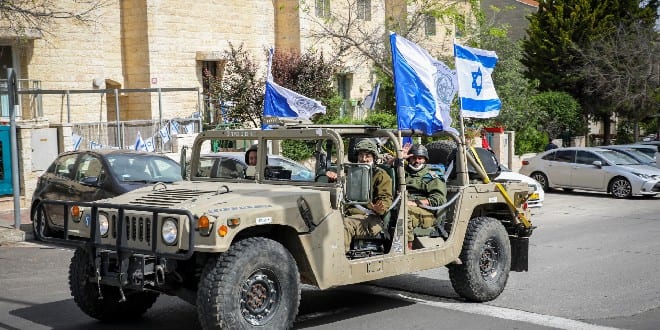As the day to memorialize Israel’s fallen went out on Tuesday evening, Israelis and Lovers of Zion around the world wiped away their tears and began to celebrate the 72nd anniversary of the modern manifestation of God’s promise to the patriarchs.
Normally a time of parades, public gatherings, and parks smoky with barbecues, the beginning if Yom HaAtzmaut (day of independence) was abnormally subdued due to a holiday lock-down and Health Ministry restrictions. But Israelis were united as This was clearly expressed in the national ceremony on Tuesday night. For the first time, the traditional torch-lighting to honor Israel’s 23,816 fallen soldiers and terror victims was pre-recorded without an audience at the military cemetery on Mount Herzl. The ceremony serves as a transition from Memorial day to Independence day.
“We’ve never had an Independence Day like this. We’re far apart physically, but we’ve never been closer,” said Prime Minister Benjamin Netanyahu in a video address.
Netanyahu also said that “with God’s help, we will hug each other next year ‘man to his kinsmen’. The Hebrew phrase he used, is only mentioned in the book of Esther אִישׁ לְרֵעֵהוּ׃
That is why village Yehudim, who live in unwalled towns, observe the fourteenth day of the month of Adar and make it a day of merrymaking and feasting, and as a holiday and an occasion for sending gifts from man to his kinsmen. (Esther 9:19)
Many cities canceled their fireworks displays to prevent people from violating social distancing. Another national tradition that was tangible missing was the IDF flyover of the country, which is always a distinctly inspiring sight. In its place was an aerobatics display over hospitals by the propeller-driven Efroni trainers.
As in other countries, Independence Day is normally a secular celebration of a historical milestone but this year, a powerfully religious tone was given to the holiday as the torch was lit by Israel Almasi, CEO of Yedidim, a massive network of volunteers who provide roadside assistance to their fellow citizens. During the Coronavirus crisis, volunteers have expanded their work to include providing varied assistance to elderly Israelis.
“I am Israel, the son of Jethro and Zahava Almasi,” he said as an introduction. “I come to this from the peak of 25,000 volunteers for Yedidim from all segments of Israeli society. Who are happy to leave their homes, time after time, leave their families and their jobs, their warm beds, to give necessary aid to whoever needs it, at any time and anywhere, all for the sake of our mutual connection.”
“This is the good side of Israel. This honors the connection that binds all of the people of this wonderful country. And this honors the King of Kings, the Holy One, blessed be he. Everything is from Him and everything is for His blessed honor, and for the glory of Israel.”
Though thanking Hashem (God, literally ‘the name’) is not normally a part of the Independence Day curriculum, segments of the religious Jews pray Hallel’, a verbatim recitation from Psalms 113–118, on the holiday. Hallel is regularly recited as on joyous occasions including the three pilgrim festivals mentioned in the Torah: Pesach (Passover), Shavuot, and Sukkot. It is also recited on the non-Biblical holiday of Hanukkah and recited in part on Rosh Chodesh (beginning of the new month).
As per a ruling by the Chief Rabbinate in 1950, Independence Day is considered a minor holiday for which the Hallel is recited. In 2015, Rabbi Shlomo Riskin of Efrat founded Day to Praise, a global initiative which calls on Christians around the world to join in reciting the Hallel with the Jewish people, on Israel’s Independence Day.
A uniquely COVID-19 rendition of the Hallel service was recorded in Jerusalem by BIN correspondent, Joshua Wander.
Source: Israel in the News

